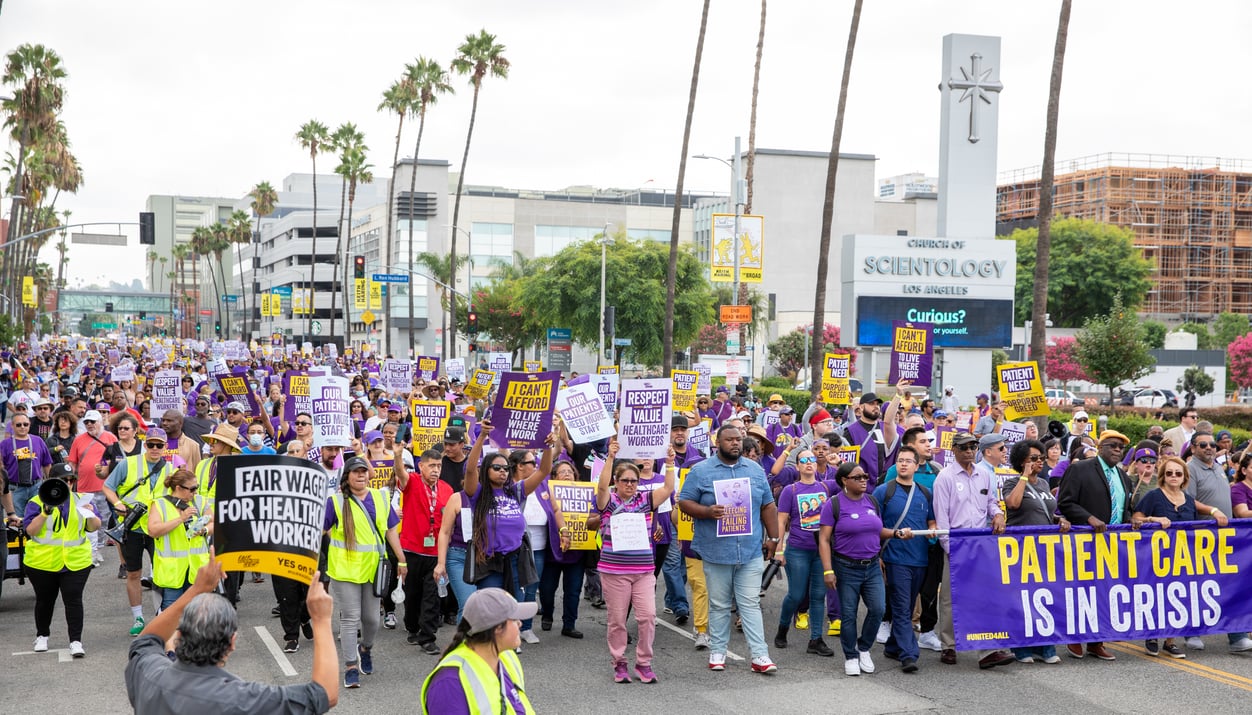labor
The latest with the Kaiser Permanente strike

Courtesy of SEIU-UHW
Kaiser Permanente health care workers who went on strike last week notified Kaiser yesterday of future strike plans, my colleague Brittany Trang reports.
The next possible strike would take place Nov. 1-8, once a contract for 3,000 workers in Seattle expires at the end of October. The Coalition of Kaiser Permanente Unions also said the November deadline would “give Kaiser executives more time to organize themselves around viable proposals.” The next bargaining sessions are scheduled for Thursday and Friday.
Last week, Reuters reported that acting U.S. Labor Secretary Julie Su was brought in as a mediator for last-ditch negotiations before last week’s three-day work stoppage. But attempts to broker a deal on the eve of the strike failed, and talks broke off Wednesday as the strike got underway.
The union said labor outsourcing has emerged as “a major sticking point” in negotiations, as Kaiser executives “have refused to agree to common sense limitations on subcontracting and outsourcing.” Kaiser said in a statement Monday evening that it “will continue to bargain in good faith” with the union.
health insurance
Don’t shrug off your health benefits enrollment
It’s that special time of year when everyone’s HR reps start to kindly tell everyone they will need to pick medical benefits again for 2024. Of course, after a spree of reminder emails, most people will put it off until the day before the deadline, check a couple enrollment boxes, and then forget the entire process until next year.
Well, dear reader, I am here to say that as excruciating as the process might be, don’t ignore it. Especially this year. It might be hiding a pay cut. Just look at what federal employees and their families are about to face.
The Federal Employee Health Benefits program, the self-proclaimed “largest employer-sponsored health benefits program” in the country, released information about 2024 health plans. The average increase to premiums is 5.8%, driven by “increases in cost and utilization to specialty and brand drugs, emergency room care, and outpatient care.”
It’s more drastic than that even seems: Employees and their families are having to pay an additional 7.7% on average for their share of their health coverage, while the federal government is only chipping in 5% more for its share. Just to make this crystal clear: If you are a federal employee, and your pay raise for 2024 is less than the increases to your health insurance, you are taking a pay cut.
This reminds me of what KFF’s Gary Claxton told me last year, when he had concerns for what employees and their families were about to face going into the 2024 benefits season: “We’ll see a bigger premium increase than we’ve seen in a while.” (Another reminder: We’re just a couple weeks away from when KFF releases its annual tome on employer-provided health benefits.)
hospitals
Who is buying what now
Venture capital firm General Catalyst is looking to buy a hospital system, my colleague Mohana Ravindranath reports from the HLTH conference.
General Catalyst didn’t give many details, but Marc Harrison, the former Intermountain CEO who is leading this effort at General Catalyst, said they “are not interested in simply serving a bunch of rich people in some suburb somewhere.”
Read the rest of Mohana’s story to understand how this spinout, called the (shudders) Health Assurance Transformation Corp., will work.



